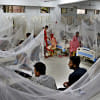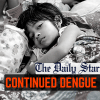Why is our drive against dengue so unscientific?

With the dengue situation in the country worsening by the day, it is truly frustrating to see the authorities resorting to the same tried-and-not-tested methods of mosquito control, without any real effort or investment into understanding whether their approaches are working. In fact, at a recent conference in the capital, noted entomologists in the country argued that the current measures undertaken by the city corporations are unscientific and farcical, and are actually contributing to the surge in dengue cases.
Experts have long warned that fogging, the most cited method of dengue control by the city corporations, is ineffective in curbing the dengue menace, as Aedes aegypti does not live inside sewerage lines or drains, and can kill at most 20 percent of the mosquitoes. Meanwhile, ad hoc measures, such as importing bacteria (Bacillus thuringiensis israelensis) for mosquito larvae control, will fail to provide a sustainable solution for dengue, and may, in fact, prove to be dangerous. The scientists pointed out that dengue control in neighbouring Kolkata was successful because they made use of their entomologists and other experts to come up with a scientific and comprehensive plan to eradicate mosquitoes from their communities. We join the experts in asking the critical question: why has Bangladesh not done the same?
It is obvious by now that the country and the institutions tasked with tackling dengue lack the necessary data and research to devise methodical solutions to the public health crisis. What is equally evident is the authorities' reluctance to listen to those with expertise to fill in their knowledge gaps. It is of urgent importance that the government bring doctors, public health professionals, entomologists, urban planners, city corporation officials and other stakeholders together to devise a coordinated action plan, not just for the immediate future, but for the long run, as by now, we know that dengue is here to stay. Investments need to be made in researching the virus, methods of transmission and serosurveillance, alongside evaluations of existing mosquito-control measures. We must study and learn from the best and worst practices of other countries also battling dengue and prioritise data-driven approaches and adaptive technologies over traditional methods. Science, not bureaucracy, must be the driving force behind our fight against dengue.


 For all latest news, follow The Daily Star's Google News channel.
For all latest news, follow The Daily Star's Google News channel. 









Comments